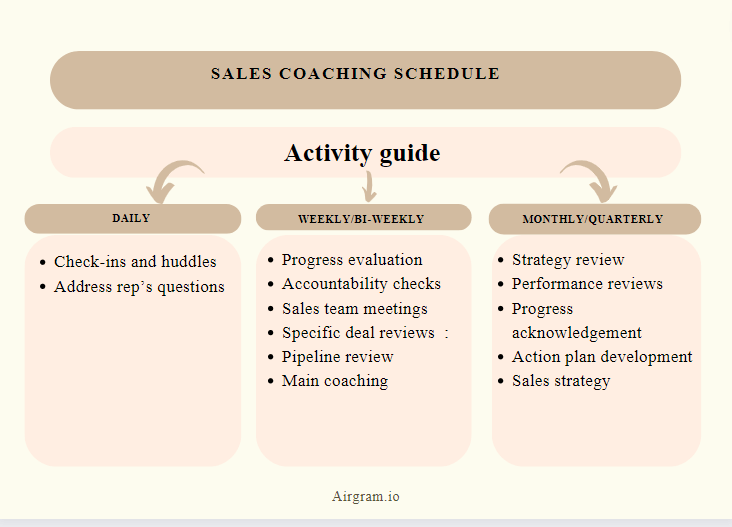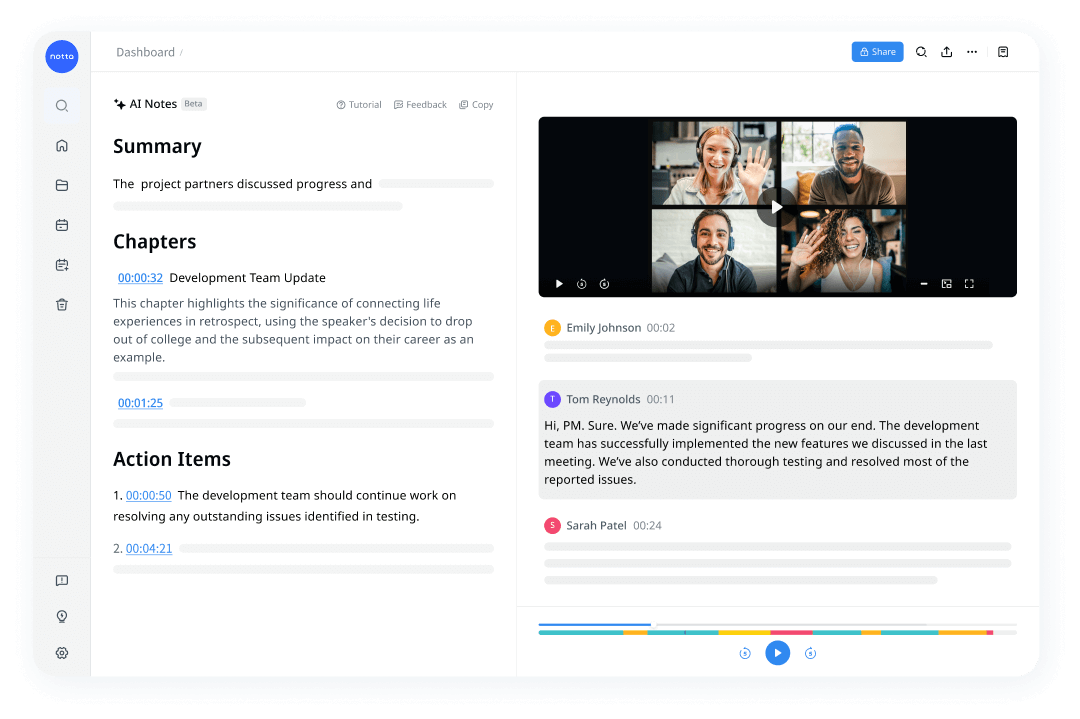
Sales Coaching Guide: Benefits, Examples, and 12 Proven Techniques
Record, transcribe and summarize conversations with one click.
Do you know that a staggering 96% of sales leaders agree that effective sales coaching positively impacts salespeople’s performance.
In today’s market, no team can solely rely on talent to consistently close deals and maintain good sales performance. Great sales skills, agility, and a thorough knowledge of the market have become non-negotiables for staying profitable and competitive.
And sales team coaching can help sales reps imbibe these qualities and drive sales.
In this guide, we will share 12 proven sales coaching techniques that will help you unleash your team’s full potential and are effective for both remote and hybrid teams.
What is sales coaching?
Sales coaching is a personalized, ongoing process that focuses on enhancing reps’ sales skills and performance through consistent guidance, support, and feedback. It is often conducted by a sales manager or an experienced salesperson.
Effective sales coaching is characterized by repeated one-on-one interactions led by a sales leader, a development plan tailored to individual rep’s weaknesses and goals, accountability, and performance reviews.
Sales coaching vs. sales training
Sales coaching and sales training have been described as “peas in a pod” because both approaches are valuable in a comprehensive sales development program. However, they differ in the following ways:
Target audience: Sales coaching is typically highly personalized and focuses on the specific needs of an individual rep while sales training often involves a larger audience.
Timeframe: Sales coaching is usually continuous and it happens regularly - usually to guarantee long-term skill development. Sales training is often a one-time or periodic event designed to deliver specific knowledge or skills.
Focus: Sales coaching often focuses on empowering reps by providing them with guidance and support while sales training is more concerned with imparting knowledge, such as sales methodologies, product information, and industry trends.
Why is sales coaching important?
Several studies attest to the efficacy of sales coaching, especially in achieving the underlying goal of every sales team effort - successfully closing deals. According to Spotio, effective sales coaching can increase your sales team’s win rate by 29%!
Sales coaching also has several qualitative benefits for individuals and teams.
Guarantees continuous development: What makes sales coaching especially effective is that it is never a one-off event. It prioritizes frequent contact to address challenges and monitor progress. So, for as long as a rep remains on a sales team, they can count on coaching to help them get better.
Helps reps navigate complex sales scenarios: Consistent practice and feedback, which are characteristic of sales coaching, offer the perfect opportunity for sales reps to learn how to tackle real-world sales challenges and navigate complex sales scenarios.
Instills organizational and industry best practices: Best practices are ideal standards set for executing tasks and they often represent the most effective and efficient ways to do things.
Many managers include best practices in their sales training. However, sales coaching is a great way to reinforce these standards and ensure compliance.
Makes reps adaptable to market changes: Agility and responsiveness are non-negotiable in today’s evolving and competitive sales climate. Through continuous and iterative sales coaching, individual reps and teams become more adaptable to changes in the market.
Improves employee retention: Effective coaching can improve job satisfaction and engagement. Happier and more engaged reps are, in turn, less likely to leave the organization.
Now, if you are ready to increase sales effectiveness and make your team more adaptable and motivated, invest in sales coaching.
Examples of sales coaching
Sales coaching is very versatile and can take on various forms. So, it will look different across teams, organizations, and individuals.
Here are some examples of sales coaching:
Conducting a role-play exercise with a rep by simulating a challenging sales situation.
Reviewing a rep’s current sales pipeline and analyzing each prospect's status, potential objections, and the best strategies for moving deals forward.
Having a goal-setting session and jointly developing actionable steps and a timeline for achieving them.
Regular one-on-one check-in meetings to review progress and address blockers and concerns.
Listening to recorded sales calls of a rep and discussing where they did well and where they could improve.
Conducting a post-mortem analysis with a rep after a major lost sale.
Conducting competitive analysis sessions and discussing how the knowledge can be used to refine a rep’s sales approach.
Having negotiation strategy sessions to figure out favorable concessions, pricing, and terms.
12 Sales coaching tips to empower your sales team
Even though sales coaching places responsibilities on both you and the rep, as a leader, the bulk of it is on you. You need to tailor your engagement to the sales rep and are responsible for the coaching schedule, materials and content.

Here are some best practices to guide you.
1. Follow the sales data
The expression, “Numbers don’t lie,” could not be more apt. When it comes to assessing your reps’ or team’s performance and determining areas to work on, data is often the most objective way to make your decision.
For instance, if you notice that the number of qualified leads is increasing while the number of closed deals is falling, there could be a problem with how the leads are nurtured. If that is the case, you have to coach on the rep’s engagement activities.
However, this is not to imply that you cannot act on your own observations. You can identify areas of weaknesses in quantifiable skills, such as how they deliver their pitch, how they respond to questions, etc., by simply observing them.
Assessing sales results, on the other hand, should be based on clear data.
So, where exactly can you get the data? The best places to obtain sales data are from your CRM and sales tracking software. Just ensure that the software functions optimally and the data is up-to-date.
2. Communicate your vision and get their input
Simply dishing orders is an ineffective and outdated management approach - especially when it comes to coaching a sales team.
While you are required to have a clear vision for your team in line with the organization’s overarching goal, selling the vision to your team by explaining why it is important and beneficial is great practice.
Don’t think of this as an opportunity to throw out an arbitrary number as your sales target. You have several other opportunities to do that when setting annual or quarterly sales goals. Your vision should, instead, focus on shared benefits or values for individual reps and the team collectively.
3. Encourage sales reps to self-evaluate

“How do you get reps involved in their own development? Flip the coaching paradigm on its head. People value what they conclude for themselves more than what they’re told.” - Steve Richard, SVP, Value Realization
Even though you probably already have an idea of what each rep needs to work on based on your observations and data, it is not your responsibility to tell the reps what to do or think. Your role in driving the conversation is strictly mentorial.
So, instead of presenting reps with a list of what you think they should work on, use open-ended questions to guide them to reflect on their performance and identify the issues themselves.
Some questions you can ask to get them started are:
What would you like us to discuss today?
What are your thoughts on your recent sales report/lost sale?
What do you think is responsible for the deal falling through?
What could you have done differently?
How was your recent call with the client?
Why do you think this sale succeeded?
How does it make you feel?
Pro tip: If you are keen on bringing an issue to their notice, couch your questions to center it.
4. Create action plans
After identifying an area of focus for your coaching sessions, work with the rep to create an action plan.
Ensure that they are actively involved in mapping out the plan and that it reflects insights from the conversation you have had up until that point.
The plan must be clear and should include:
A step-by-step breakdown of how the objective will be achieved.
Expected timeline for the completion of each task and the overall objective.
Key performance indicators or metrics for measuring success.
A schedule for check-ins or progress reports.
5. Understand reps’ motivation, stressors, and blockers
Three major factors that have a significant bearing on every employee’s performance are - their motivation, stressors, and blockers. To coach effectively, you have to understand each rep’s motivation and utilize it to devise their unique coaching program. Sales coaching is also an opportunity to guide them on how to manage stress and overcome blockers.
How do you find out?
It’s not rocket science. You can use a mix of open and close-ended questions such as:
Do you feel motivated right now? Why?
What do you want to get out of this role/this sale?
What motivates you in the short and long term?
How can I help you stay motivated?
Have you been feeling stressed lately? why?
How do you manage stress? Do you think this method is healthy and effective?
What can we do to help?
What has been getting in the way of your progress with this sale?
What challenges have you been experiencing with engaging clients recently?
How do you think you can address this?
6. Coach the way reps actually sell
Your coaching approach should not simply be to do things how you like to do them because this is bound to fail. It is also opposed to the main point of sales coaching which is to provide personalized guidance for individual sales reps.
It is more effective to coach exactly how the reps sell. So, if a rep sells via calls and meetings, it would be counter-intuitive to coach them via emails or messages. Coach them, instead, using calls and meetings so that the sessions are more helpful and applicable to reps’ day-to-day engagements.
You can extend this principle even further by allowing reps to decide how they want to be coached.
7. Utilize sales call recordings
You can’t sit through every sales call with your reps to observe their technique - and even if you could, it is a bad use of your time and you are likely to miss some details in the moment. These are what make sales call recordings so great.
Sales call recordings allow you to run a quick diagnosis of a rep’s sales approach to identify mistakes and strong points. You can also get an idea of what the customer values and coach the rep for subsequent calls.
The recordings can also serve as positive examples to demonstrate good sales techniques or negative examples of what to avoid on a sales call.

All these will, however, be naughty without the right software. And while it might seem a little biased, we recommend Notta meeting assistant for the following reasons:
Notta has both audio and video recording so you can conduct a more robust assessment by listening to and watching sales calls and demos.
It transcribes sales call recordings if you’d like to access the conversation in text form or create a script from it.
Notta is compatible with all major conferencing tools like Zoom, Google Meet, MS Teams, and Webex.
You can integrate Notta with your CRM like Salesforce to automate your workflows.
Notta offers the most integrated AI meeting notes, summaries, and action items so nothing gets missed.
8. Motivate your team with incentives
Every rep has their unique motivations. They could include financial gain, flexible working conditions, words of affirmation, opportunities for career advancement, and additional paid vacation.
Applying the right incentives can inspire your reps to work harder, commit better to the coaching program, and achieve their goals.
That said, it is advisable to offer a range of monetary and non-monetary incentives, such as gift cards, trips, and bonuses, to cater to their different preferences and motivations. A diverse incentive range can hit different points of motivation and increase the possibility of getting a rep to put in the work.
The incentive structure should also be tiered with higher rewards as reps achieve progress and attain higher performance levels.
9. Focus on one improvement at a time
When it comes to working on improvements, less is certainly more.
Everyone has a threshold of what they can handle at a time. Therefore, requiring reps to work on too many things at the same time will divide their focus and leave them overwhelmed.
Reps are also likely to progress faster when they have a single, simple plan than when overburdened with several areas of improvement to work on with similar timelines.
For example, if a rep is having a hard time nailing their sales pitches because they get nervous, it would be best to spend your coaching sessions practicing their pitches, building confidence, and reviewing call recordings to monitor progress. Introducing objection handling to the mix would not be the smartest thing to do.
10. Conduct periodic performance reviews
Don’t play it by ear. Be intentional about conducting the reviews.
Conducting periodic sales performance reviews allows you to regularly evaluate the effectiveness of your coaching approach and refine your strategy where necessary.
The reviews also provide valuable insights into the impact of your coaching on individual and team performance.
11. Establish a two-way feedback system

Feedback should go both ways. While you are allowed to share your thoughts and feedback to help a rep perform better after a roleplay session, for example, they should also be allowed to air their thoughts on your approach and if it works for them.
This might not be easy to establish - especially because they might be reluctant to question or comment on your coaching program or approach. Therefore, it is your responsibility to:
Build a psychologically safe environment within and outside your coaching sessions
Ensure that there are open and accessible communication channels for reps to reach you between scheduled sessions
Regularly review and adjust your coaching program based on the reps’ feedback and results.
12. Provide positive reinforcement
Selling is hard enough and reps need constant positive reinforcement to build confidence and boost their morale. You do not want to leave them feeling discouraged or compounding their disappointment by constantly talking them down.
Several studies have shown that positive reinforcement is generally more effective than negative feedback. And as a rule, you should give three times as much positive feedback as negative.
This is not to imply that you should not be honest. You should. However, try to look for the positive and encourage them to keep up the good work. And when you have to present negative feedback, avoid being rude or unnecessarily critical.
13. Follow up
Have a definite follow-up schedule and stick to it. Following up regularly helps the rep to stay on track with the goals and allows you to keep track of their progress and identify areas you can offer your help or guidance.
Your follow-up schedule can include one-on-one check-ins and email or text exchanges.
Some questions you can ask to kick off the conversation include:
How far have you gone on this task?
Have you been sticking to your practice schedule?
What challenges have you encountered recently?
Would you like us to make adjustments to the plan?
Have you been making progress?
How to measure the effectiveness of sales coaching?
It is not enough to simply rely on the sales coaching techniques above. You must also periodically evaluate their effectiveness by employing a systematic approach that combines data-driven analysis, progress tracking, and assessments. Here’s how:
Use data and metrics to measure sales performance
Start by setting clear KPIs in line with the areas of improvement identified and sales goals. Once you have established the KPIs, leverage CRM to obtain the data you need to measure their performance.
You must analyze the data regularly to identify trends and the impact of coaching on specific areas of sales improvement targeted, such as revenue generated, conversion rates and closing ratios.
Establish a coaching cadence and track progress over time
Develop a schedule for coaching that suits the rep’s goal, but ensure that it doesn’t throw a wrench in either party’s schedule. You want to make sure that the sessions are consistent, but not too frequent. A weekly or bi-weekly cadence would often be a great place to start and you can reduce the cadence as the rep improves and becomes more independent.
Once you are settled on a cadence, document the rep’s progress based on their reports and your observation in each session. This is especially relevant to qualitative skills such as building confidence, improving communication, and handling objections.
Use a grading system to assess their performance on preset metrics
Choose an easy grading system. For example, a scale of 1-10 or an A-F scale, to assess and score your reps’ performance in different metrics. This way, you can immediately note when they make progress and how their performance advances over time.
Monitor how the grading trends evolve and adjust your coaching strategies where necessary to address persistent challenges.
Bonus tip: Make these reviews a collaborative effort and work with the reps to create personalized development plans based on their performance grades.
Lead with intention
As the leader, the success of your team’s coaching program is largely dependent on you. You must lead with intention and discernment. So, while this article provides you with a solid guide on how to effectively coach your team, you need a clear purpose and good judgment as your anchor.
These will help you properly apply these tips to develop a program that is suited to your team and make changes where necessary.